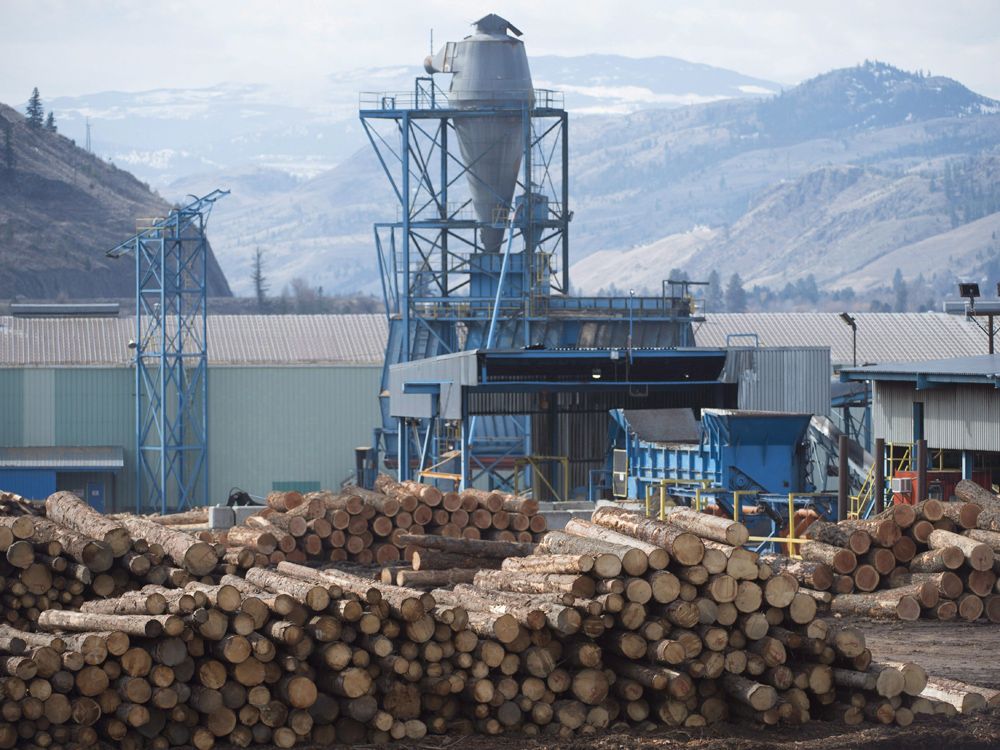The United States Department of Commerce is set to hike duties on
Canadian softwood lumber
to 34 per cent this fall, the latest blow in a dispute with Canada that goes back decades.
“We’re going to need some support measures put in place to help us weather this storm,” Kurt Niquidet, president of the BC Lumber Trade Council and chief economist at the BC Council of Forest Industries, said. “There’s going to be some financial liquidity issues for companies, so the federal government needs to step up and provide some loan support to help us get through this.”
Last Friday, the U.S. Department of Commerce announced its decision to more than double countervailing duties on imports of Canadian softwood lumber to 14.38 per cent from 6.74 per cent. This is in addition to its decision in early March to raise the preliminary rate on anti-dumping duties to 20.07 per cent from 7.66 per cent, bringing the total to 34.45 per cent.
“It’s obviously very concerning,” Ian Dunn, chief executive at the Ontario Forest Industries Association, said. “Even under the existing trade environment, with the duties that we’ve seen historically, we’ve seen companies curtail operations, we’ve seen companies close mills, reductions of shifts and layoffs.”
Existing U.S. duties have already had an impact on the Canadian lumber industry. Vancouver-based
Canfor Corp.
in September announced the closure of its sawmills in Vanderhoof and Fort St. John, British Columbia, citing an increasingly difficult regulatory environment, high operating costs and “punitive” U.S. tariffs. The decision affected 500 workers.
Dunn said the lumber dispute between Canada and the U.S. is now in its fifth iteration. The 2006 Canada-United States Softwood Lumber Agreement was in place until 2015, and the Canadian industry has been subject to duties since 2017.
The U.S. contends the Canadian lumber industry has unfair competitive advantages and is subsidized because most companies operate on land owned by the provinces and the stumpage fees — the fees companies pay to harvest trees — are too low.
Dunn said Canada continues to dispute this argument in cases and panels at the World Trade Organization (WTO) and the
Canada-United States-Mexico-Agreement (CUSMA)
, but the WTO’s decisions in favour of Canada are not binding and efforts under CUSMA remain unsuccessful.
“We’ve had a long and sustained legal effort contesting and appealing virtually every decision by the Department of Commerce, with little to no effect,” Dunn said. “Because the Department of Commerce’s mandate is essentially to protect the domestic industry, they will find dumping when it doesn’t exist, they will find subsidy when the Americans are doing the exact same practices.”
Mark Warner, principal counsel at MAAW Law, said the dispute with the Americans has been happening since Ronald Reagan’s administration and he sees little possibility of a resolution.
“I don’t think this dispute is capable of being resolved,” he said. “I don’t think you’re ever going to see a situation where American governments are going to accept the stumpage fees.”
U.S. President Donald Trump
has launched an investigation into timber and lumber products from several countries based on national security grounds. He has also threatened further tariffs on Canadian lumber and has signed an executive order that calls for an increase of domestic timber production on U.S. federal land.
The National Association of Home Builders (NAHB), one of the largest trade organizations representing the interests of home builders in the U.S., said it is against further tariffs on Canadian lumber.
“NAHB will continue to urge the White House to roll back tariffs on lumber and other building materials and remains focused on improving building material supply chains and easing costs for our members,” it said in a statement issued on Tuesday.
Niquidet said Canadian softwood lumber makes up 24 per cent of the U.S. market share, which will be hard for that country to replace.
“The U.S. will still need to import lumber from Canada,” he said. “There is just no way that they can replace 24 per cent of the market; it’s going to take them several years.”
Niquidet added the new duties will lead to price increases in the U.S.
• Email: jgowling@postmedia.com
Bookmark our website and support our journalism: Don’t miss the business news you need to know — add financialpost.com to your bookmarks and sign up for our newsletters here.
'Very concerning': Lumber industry dismayed as U.S. tariffs soar on Canadian softwood lumber
2025-04-09 18:15:08





